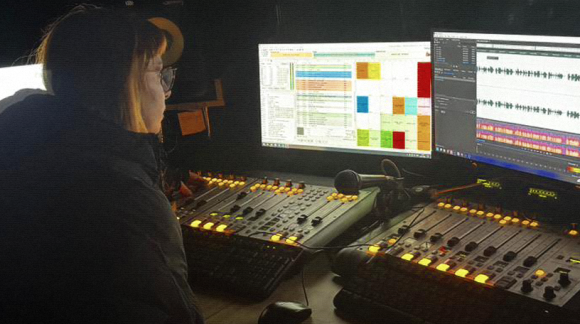The IMI representative in Volyn oblast, Maya Golub, spoke about her experience and the work of other journalists during the Russo–Ukrainian war at the RE:Cover conference on November 26 in Krakow (Poland).
Maya Golub explained how the Russo–Ukrainian war affected the work of journalists in her oblast. According to her, the war hardened many journalists. After all, last year they had to endure six or seven hour blackouts, quickly “get over” the explosions and keep working.
“I remember how one day I had to submit an analysis by the deadline, and there was no power at home. I had to travel across Lutsk city to a cafe that had electricity to work. But I didn’t stay there for long, as they asked me to leave the place due to an air raid alert that had started. After that, I went to my friends’ office to work, but I didn’t stay working there for a long time either. After 30 minutes, their power also went off. Now I have Internet connection that works even without electricity if you have a power bank. I also have a power bank for my laptop, so I’m ready to work during a blackout now,” the journalist recalled.
She noted that the war made adjustments to her work and she had to do things she had not done before. “Making lists of journalists who want bulletproof vests and helmets in order to send them bulletproof vests, helmets, power banks which they needed for their work,” the journalist added.
Maya Golub also said that last year was a new experience for her as a fixer with Polish journalists. She also had to become a Polish interpreter for them, because the English interpreter with whom they had previously agreed to work decided to go to Krakow on the day of the meeting with foreign colleagues without a prior warning. Maya had to translate a lot of information to foreigners for the first time without any advance preparation.
The participants of the Krakow conference also discussed an example of “information bubbles”. Namely, the unreasonably high expectations about the UAF counteroffensive.
According to the journalist, it is important to read as many verified sources as possible.
“You need to get information from different sources and get out of your ‘information bubble’ to learn more. It is important to listen to real experts. Unfortunately, some media tend to manipulate the topic of the war. They publish exaggerated headlines, twisted facts, use clickbait. While journalists should stay balanced and not resort to manipulation and exaggerations. The news we produce here are important, because the information can be quickly translated and shared in foreign media,” said Maya Golub.
The event also raised the issue of ethics when it comes to investigating the Russians who commit crimes against Ukrainians. “I believe that these Russians should be investigated and all this should be made public, because there should be more examples and evidence of international and war crimes,” said the journalist.
Finally, the IMI representative Maya Golub noted that since the start of Russia’s full-scale invasion of Ukraine, the Russians have killed 69 journalists (as of November 27, IMI has already recorded 70 cases).
The conference was organized by the European Center for Press and Media Freedom.

